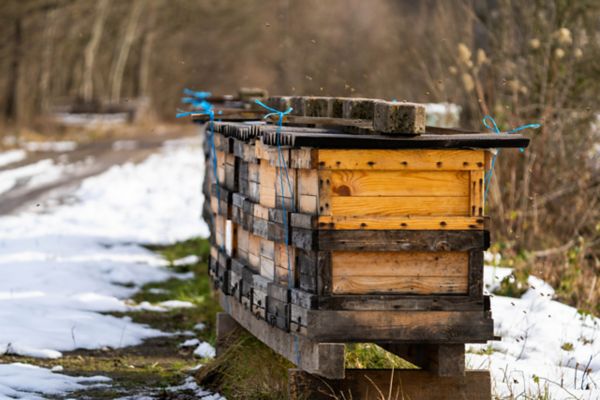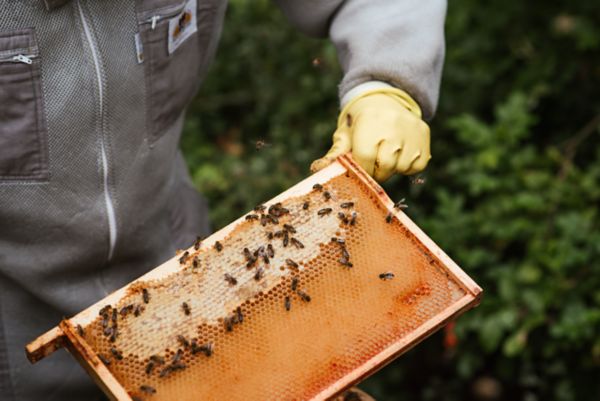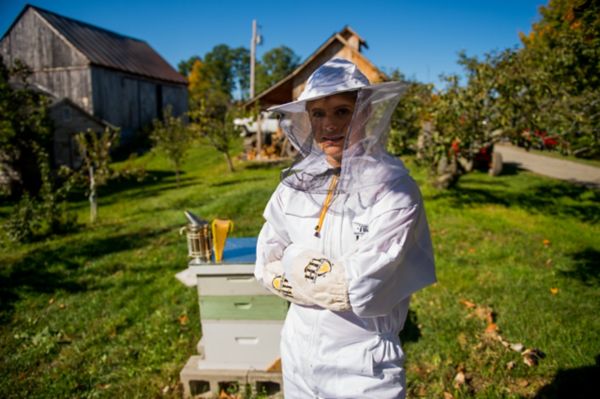Beekeeping 101: How to Start Beekeeping
Authored by Hannah Mather of Hannah's Honeycomb
Beekeeping can be a rewarding experience for the whole family, but it’s important to do your research before bringing home your first hive. Read on for some tips on how to best prepare for your new buzzing friends.
Determine your beekeeping goals
Determining goals for your bees is the first thing you need to do, as management techniques will vary depending on your priorities. Here are a few reasons you might consider for keeping bees:
Scientific fascination: Honey bees offer an amazing glimpse into the complexities of nature, and the more you learn the more fascinating they are. From their biology, social structure, and unique interactions with plants, there are endless lessons to be learned.
Honey production: Honey, the liquid gold that everyone thinks of when they think of honey bees! Nothing can quite beat local honey fresh from the hive, and its sure an exciting part of beekeeping. That being said, honey production is not always a given for every colony in every location, and you may end up disappointed if you expect a honey harvest your first year. It takes time for a new beekeeper to develop skills and for a colony to build up enough to have excess.
Pollination: If you have a garden, pollination is a great reason to consider keeping bees. Honey bees can help to increase crop yields by providing pollination to your veggies and flowers and reduce the amount of hand-pollination needed!
Queen production: More experienced beekeepers may start to dive into the business of queen production. It’s a fascinating area of beekeeping, and one that is always in demand.
Nucleus colony sales: When you have many strong colonies, you’re able to make splits during the spring and sell “nucleus colonies” which are essentially mini colonies consisting of 5 frames of brood, honey and a queen bee.
It’s important to note that while there are many valid reasons for keeping honey bees, “saving the bees” is not one of them. Honey bees are not native to North America, and therefore are not the bees that need saving from a conservation perspective. Honey bees are significant to the agricultural economy due to their important pollination services which increase crop yields and beekeepers can intervene when environmental factors impact them. The other 4000 species of bees native to North America are the ones who truly need our support, and that is done through habitat restoration and reducing the usage of pesticides.
Honeybees are not native to North America, and therefore are not the bees that need saving from a conservation perspective.
Get bee educated
Now that you've established your goals, it's time to start researching and getting educated on bees. There's a few ways to get go about this. Reading books, taking some classes and joining your local beekeeping groups will give you a great start on starting your hive. Take some time to meet other beekeepers in your community and share knowledge.
Bees are animals that need care and maintenance, they can’t be set up and forgotten about. An unmanaged hive can even be detrimental to other bees in the area by harboring pests and diseases. Make sure you have a solid education before you bring bees home so you can be set up for beekeeping success.
Read books about beekeeping
Resource books are great to have on hand for when you run into questions (which you will). Some of my favorites include:
- Beekeeping for Dummies by Howland Blackiston
- The Backyard Beekeeper by Kim Flottum
- Beekeeping for Beginners by Amber Bradshaw
- Honeybee Democracy by Thomas Seeley
- The Lives of Bees by Thomas Seeley
Take classes
Many private beekeepers as well as universities offer beekeeping courses both online and in-person. I highly recommend finding and taking at least one.
Join your local Beekeepers Association
Most counties have a beekeeper’s association which can be an invaluable resource. Climate and local resources make a big difference for management techniques, so the more local information you can absorb the better. Many have mentorship programs or even a group apiary for hands on learning. To find a beekeeper’s association near you, contact your local county extension office and they will be able to point you in the right direction! This is the number one tip I recommend to all new beekeepers.
Getting your hives ready
Buy proper beekeeping equipment: Before bringing bees home, make sure that you are ready for them with the proper equipment. When you’re going through your checklist, be sure to include hive components, safety gear, feed and mite treatments.
Pre-order bees: In most areas of the country, bees are ready for their new homes in late spring. You can pre-order bees as soon as you’re ready to commit. You can buy bees as packages by the pound or as nucleus colonies. There are pros and cons to each, but whichever you choose will come with a queen and plenty of workers.
Choose location: Next, choose the perfect spot for them. Check your local regulations to see if you’re able to keep bees at your home and any requirements that may be needed. Typical recommendations include:
- Not in a highly trafficked area
- Entrance facing East (this maximizes the amount of daylight the bees sense for longest days of foraging)
- If you decide to keep bees at your home, have them behind a fence at least 6 feet high so that they fly above head level as they leave your yard
- Close to abundant floral resources
Before bringing bees home, make sure that you are ready for them with the proper equipment.
Be prepared for hive interventions
Things can and do go wrong often in beekeeping. Have a plan in place to identify and resolve the possible problems. Read more about these common beekeeping issues.
- Queen loss
- Nutrition
- Mites
- Hive beetles
- Wax moths
- Colony robbing
Queen loss
The queen is the only member of the colony who is able to lay eggs for the next generation, so she is very important for the life of the colony. Each inspection, check for the presence of the queen. It’s ok if you don’t spot the queen herself, if you can spot eggs, you can rest assured that she’s been there recently.
Have a plan in place if you find your colony is queen-less. There are a few options you can try at this point. If you have multiple colonies, you can take a frame from another hive that contains eggs and open brood to give the queen-less colony an opportunity to create a new queen. If you only have one hive, you may not want to take any chances and will want to purchase a new queen from another beekeeper.
Nutrition
With widespread loss of native plants and flowers as cities continue to expand outwards, keep an eye on your hive’s resources. They should have plenty of capped honey, nectar, and pollen throughout the hive to keep them healthy. If they do not, you must supplement with feed in order to keep them strong. You can purchase pre-made syrups or make your own.
Mites
Test regularly for varroa mites and be prepared with treatment options. Mite populations peak in late-summer and can take down an entire colony by fall if they’re allowed to grow without interventions.
Hive beetles
Depending on your location, hive beetles can be a pest or a real problem. Hive beetle traps can help reduce the load while keeping your colony otherwise strong will help them to ward them off on their own.
Wax moths
Wax moths are opportunistic and will often invade any frames that aren’t covered by bees. They are a reason you don’t want to give the bees more room inside the hive than they can defend. They can also destroy frames that you have stored in a shed. To help prevent this, stick frames in the freezer for 24 hours before storage to kill any wax moth larvae that may be present.
Robbing from other colonies
Small, weaker colonies can be at risk of being robbed by stronger colonies. Keep entrances small and consider adding a robbing screen if there’s a significant difference in strength between your hives.
Hannah's beekeeping mindset
In my opinion, the most important part of beekeeping is having an adaptable mindset. Be willing to learn, respond and adapt to the challenges you will face. Don’t be afraid of failure. Every beekeeper will lose hives from time to time, but its what you do with those lessons and how you improve from there that will make for a successful season.
Happy beekeeping!
Hannah is a beekeeper, horticulturist and pollinator advocate. She's passionate about sharing stories of our bee friends and their relationship to the environment. Learn more about Hannah or follow her on Instagram for more insect-size stories.




